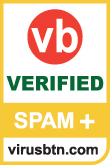Posted by Virus Bulletin on Feb 6, 2014
All solutions on test blocked at least 99.4% of spam, but some struggled with false positive issues; survey also shows few products support DMARC.
The results of the most recent VBSpam spam filter test show that all 18 of the solutions tested blocked at least 99.4% of all spam - although some struggled with false positive issues.
The VBSpam tests don't just look at products' ability to prevent spam from making it to users' inboxes, they also measure how well products perform when it comes to not blocking legitimate emails. There, the results were more of a mixed bag:
 Five solutions - OnlyMyEmail, Libra Esva, ZEROSPAM, Bitdefender and Sophos - didn't block any legitimate emails and as they also blocked more than 99.5% of all spam, they were awarded a VBSpam+ award.
Five solutions - OnlyMyEmail, Libra Esva, ZEROSPAM, Bitdefender and Sophos - didn't block any legitimate emails and as they also blocked more than 99.5% of all spam, they were awarded a VBSpam+ award.
On the other hand, for three solutions, the amount of legitimate email that they blocked was so high that they failed to achieve VBSpam certification.
We were really pleased to see such high spam catch rates. There are still billions of spam emails sent every day, many of which come with a malicious payload. It is good that almost all of these are stopped before they reach a user's inbox.
Of course, it was disappointing to see that, for some products, the high catch rate came at the cost of blocking quite a few legitimate emails. We hope that these products will see their performance improve in the next test.
In this report, we also surveyed the participants on the use of DMARC. DMARC is a specification intended to prevent email abuse: it allows the owners of often-spoofed domains to state what receivers should do with emails that fail SPF and DKIM checks. It was set up by some of the bigger players in the field of email, such as Google, Yahoo!, PayPal and Facebook, for whom spoofing is a huge problem.
While the majority of participating products check the SPF status and DKIM signatures of incoming emails, at the moment very few are using DMARC: only one out of 18 products sends feedback, while another checks the DMARC status of incoming emails, but doesn't send feedback.

The basic pass/fail results of this test are available here. For Virus Bulletin subscribers, the full test report is available here. Non-subscribers can purchase full the report as a standalone article ($19.95) here.
More on the VBSpam tests, including historical performance of the participating products, can be found here.
Posted on 06 February 2014 by Martijn Grooten